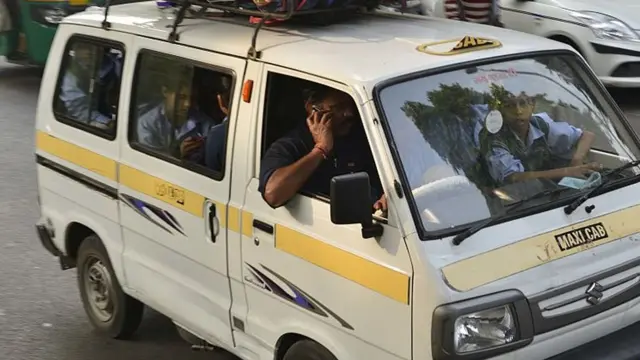Manipur Police to Take Action Against Overloaded School Vans: A Step Toward Safety
Summary
Manipur police have announced that they will be enforcing strict measures against overloaded school vans to ensure student safety. With rising concerns over the safety of children commuting to school in overcrowded vehicles, this move is seen as crucial to prevent potential accidents. The authorities are set to monitor and take action, bringing much-needed regulation to an issue affecting parents and students across the region.
Introduction: Why Overloaded School Vans Are a Growing Concern in Manipur
We all want the best for our children, especially when it comes to their safety. But what happens when the very mode of transportation they rely on becomes a source of danger? In Manipur, the sight of overcrowded school vans has become all too common. Parents watch helplessly as their children are crammed into small vans, risking their lives every day just to get to school.
This issue isn’t just an inconvenience—it’s a serious safety hazard. Overloaded school vans are prone to accidents due to their instability, lack of space for the driver to maneuver, and poor road conditions. The Manipur police, recognizing this looming threat, have finally decided to take action.
But how did it get to this point? And more importantly, what steps are being taken to rectify the situation?
Understanding the Issue: How Did We Get Here?
The Problem with Overloaded School Vans
Let’s start by addressing the root of the issue. Over the years, school transportation in Manipur has evolved, but not always in the right direction. With a growing number of students and a limited supply of licensed vehicles, many school vans have started carrying more passengers than they should. This isn’t just uncomfortable for the children—it’s dangerous.
Imagine a van built to seat 10 people, but instead, it’s crammed with 20. Children are often left sitting on each other’s laps or standing in the small space available. The risks? Reduced driver visibility, increased weight on the vehicle, and a significant drop in the ability to respond to traffic or road obstacles. When a vehicle is overloaded, its brakes are less effective, and the center of gravity shifts, making it more prone to tipping over.
A Lack of Regulation
The problem has persisted partly due to the lack of strict regulation and enforcement. Although there are laws in place to prevent overloading, they haven’t been consistently enforced. Until now, that is. With the rising number of accidents involving school vans, authorities are finally stepping up.
Manipur Police Take Action: What This Means for Parents and Schools
A New Era of Enforcement
In response to growing concerns, the Manipur police have declared that they will be cracking down on overloaded school vans. What does this mean? Essentially, the police will be conducting surprise checks, inspecting school vans at various points, and issuing fines or penalties to those found violating safety norms. More importantly, repeat offenders could face harsher penalties, including suspension of their driving licenses.
This move signals a shift from reactive to proactive policing. No longer will authorities wait until a tragic accident occurs to intervene. Instead, they are taking preventive measures, ensuring that school transportation is safe and reliable.
How Will This Affect Schools and Van Operators?
For schools and van operators, this new level of scrutiny might cause some immediate disruptions. Some operators may need to invest in larger vehicles or hire additional drivers to meet the demand without overloading their vans. Schools will also be responsible for ensuring that the transportation services they partner with are compliant with safety regulations.
Though these changes may initially cause a stir, they’re absolutely necessary. After all, nothing is more important than the safety of the children.
The Consequences of Overloading: What Could Go Wrong?
We’ve touched on how overloaded vans can be dangerous, but let’s break it down a bit more. Why exactly is overloading such a hazard?
1. Higher Risk of Accidents
Overloading a vehicle makes it much harder to control. The additional weight puts extra pressure on the brakes and tires, making them more likely to fail. Plus, with so many passengers crammed into a tight space, the driver’s ability to see and react to the road is severely compromised.
2. Increased Injury Severity in Case of Accidents
If an accident does occur, an overloaded vehicle can be catastrophic. There’s less space for passengers to move or brace themselves, which means injuries are often far more severe. Emergency exits may also be blocked, making it harder for children to escape in case of an emergency.
3. Long-Term Health Implications for Children
Cramming into a small space day after day isn’t just uncomfortable—it can also lead to long-term health problems. Poor seating arrangements can cause posture issues, back pain, and other physical discomforts for children, especially those who have to travel long distances.
The Role of Schools and Parents: Ensuring Safe Transportation
While the Manipur police are taking action, schools and parents also have a role to play in ensuring their children’s safety.
Schools’ Responsibilities
Schools need to be more vigilant in vetting the transportation services they use. It’s not enough to simply hire a van operator and hope for the best. Schools should conduct regular checks to ensure that their students aren’t being subjected to overcrowded or unsafe conditions. Partnering with certified and reliable transportation services is crucial.
Parents’ Responsibilities
Parents, too, need to voice their concerns if they notice that their children’s vans are overcrowded. Speak up at PTA meetings, reach out to school administrators, and if necessary, report unsafe transportation practices to the authorities. After all, if enough parents raise the alarm, schools and van operators will be forced to take action.
What Can Be Done to Improve School Transportation?
Now that the issue is in the spotlight, what solutions can we put in place to ensure it doesn’t happen again?
1. Regular Safety Inspections
Vans should be inspected regularly, not just for roadworthiness but for compliance with seating capacity rules. These inspections can be conducted by traffic police or an independent regulatory body to ensure impartiality.
2. Educating Drivers and Operators
Sometimes, van operators overload their vehicles simply because they don’t fully understand the risks. Providing proper training on the dangers of overloading and how to drive safely can go a long way in preventing accidents.
3. Encouraging Alternative Transportation
Schools and communities could consider alternative modes of transportation, such as school buses, which are designed to carry larger groups of children safely. Encouraging carpooling among parents may also reduce the reliance on overcrowded vans.
Looking Forward: A Safer Future for Manipur’s Children
With the Manipur police now taking decisive action, the future looks safer for school children in the region. While there’s still a long way to go in terms of fully eradicating the issue, this is a promising first step. By holding van operators accountable and encouraging stricter safety measures, we can create a safer, more secure environment for students.
Parents, schools, and authorities must continue working together to ensure that this issue remains a priority. After all, ensuring the safety of children should be everyone’s top concern. Let’s hope that this move sparks similar changes in other regions, leading to better, safer transportation across the country.
FAQs
- Why are school vans often overloaded?
Many van operators take on more students than their vehicles can safely carry, often due to high demand and limited resources. - What actions will the Manipur police take against overloaded vans?
The police will conduct checks and issue penalties to vans found overloading students, with repeat offenders facing harsher consequences. - How can schools ensure safe transportation for students?
Schools can regularly inspect vans, hire certified transportation services, and work with parents to monitor and report any safety concerns. - What risks do overloaded vans pose to children?
Overloaded vans are harder to control, more prone to accidents, and can cause serious injuries due to cramped conditions and blocked emergency exits. - What can parents do if they notice unsafe school vans?
Parents should report their concerns to school authorities and the police, ensuring that proper action is taken against unsafe transportation practices.



